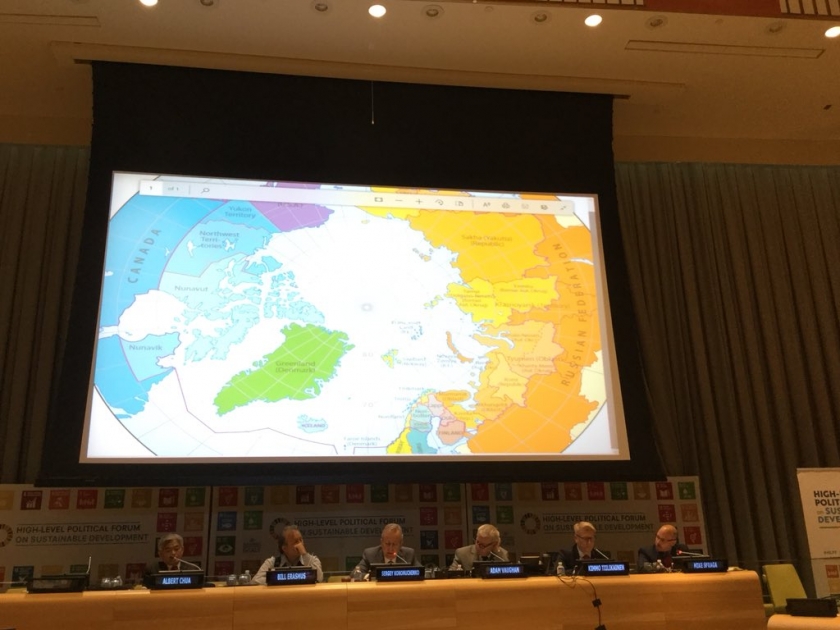Statement by Mr. Sergey Kononuchenko, Deputy Permanent Representative of the Russian Federation to the United Nations, at the Event “The 2030 Agenda and the Arctic: Towards a Sustainable and Resilient Arctic through Cooperation”
Excellencies,
Distinguished delegates,
Dear friends,
It is a great pleasure to be part of an event with such an unusual thematic focus. Indeed, we do not hear about Arctic issues every day here in New York. However, this vast northern region has a lot to offer in terms of good examples and best practices of working together and undertaking individual initiatives.
Today, I would like to focus on interlinkages between the economic and environmental dimensions of our actions in the Arctic.
Russia strongly believes that it is possible to achieve the Sustainable Development Goals in the Arctic only if we promote economic activity in the region. As of today, 10% of my country’s GDP and 20% of exports derive from its Arctic area and we estimate that the region’s contribution to our economy will be growing in the upcoming years. Against this backdrop, we are planning, among other things, to further build sound infrastructure, strengthen resilience of cities and human settlements and provide local communities with access to quality education, thus delivering on SDGs 9, 11, 4 and others.
We are also adamant supporters of responsible development of natural and transport capacities of the Arctic on the basis of international cooperation with the major role of the Arctic Council. Therefore, it is important to continue strengthening the cooperation of the Arctic states to implement regional instruments including the Agreement on Cooperation on Marine Oil Pollution Preparedness and Response in the Arctic as well as the Framework Plan for Cooperation on Prevention of Oil Pollution from Petroleum and Maritime Activities in the Marine Areas of the Arctic.
From our side, Russia is taking legislative measures to promote environmentally sound modernization of industrial facilities, rehabilitation of areas and the overall reduction of negative impact on the environment. For that purpose, in 2015 we made specific changes to the federal law on environmental protection. As a result, the level of associated petroleum gas utilization has reached more than 90%. At the same time, we expect a multi-fold decrease in black carbon emissions due to a shift to the use of cutting-edge technologies. This initiative will be carried out with the assistance of the Arctic Council’s Project Support Instrument.
In 2017, Russia’s biggest petroleum and natural gas companies which are active in the Arctic, namely Rosneft, Gazprom, Novatek and Lukoil, approved corporate strategies to conserve biodiversity, particularly taking into account the species of the fauna and flora that are critical to sustaining balance of the marine ecosystems in the Arctic. These measures have already helped in stabilizing the populations of polar bears and walruses which are not under a threat of extinction any longer.
Our biggest shipping company Sovkomflot that transports petroleum and natural gas across the Arctic has become world’s first enterprise to take a decision to switch its Aframax-class oil tankers to natural gas-based fuel. Its fleet will be equipped with the new generation of oil tankers starting from this year. The shipping company has ordered 6 new vessels, the first one is to be delivered this month.
The Nornickel, Russia’s leading metals and mining company, is aiming to invest around $4 billion in its overarching environmental programme within the 2013-2022 time period. It will help achieve a reduction of sulphur dioxide (SO2) emissions by 75% in the Norilsk industrial area and by 50% in the city of Nickel, Murmansk Oblast.
Under the Clean Country project, we are restoring the Arctic territories that previously suffered the environmental damages from economic activity. Over the last 6 years it was possible to eliminate more than 50,000 tons of waste on Arctic islands. We continue to focus on specific hotspots in the Russian Arctic zone as a priority.
Last year a new waste treatment law was adopted in order to regulate collection, recycling and elimination of waste. In 2019, we will start its implementation in the Russian Arctic.
Another priority for action is the expansion of protected areas. As of late 2017, they amounted to over 27 million hectares including 9.7 million hectares of the ocean.
In conclusion, it is worth mentioning that Russia welcomes the preparation of the draft legally binding agreement on Preventing Unregulated Commercial Fishing in the High Seas of the Central Arctic Ocean. It is a convincing example of a timely response of the international community to global climate change and readiness to take coordinated preventive action to conserve biodiversity of the Arctic. We hope that the agreement will be signed within a short period of time.
Thank you.
